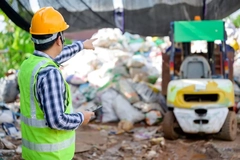August in review: INC-5.2 fails, electronic shelf label advantages, oxo-degradable limits identified

Last month, the final round of negotiations (INC-5.2) for a UN Global Plastic Treaty concluded without an agreement. We spoke to industry associations and NGOs during and after the event.
In research, electronic shelf labels in supermarkets were found to benefit consumers and scientists discovered oxo-degradable plastic breaks down poorly in open-air conditions, raising concerns for soil and plant health.
We look back at the biggest stories in August.
Packaging in Indonesia: Researchers explore reuse options as circularity barriers prevail
Convenience and economic barriers prevent Indonesia from adopting circular packaging solutions, according to a recent study. To overcome these challenges, researchers advocate for co-designing solutions with local businesses, updating regulations, and increasing consumer education. Packaging Insights spoke with Nazli Terzioglu, co-author of the study and research tutor at the Royal College of Art, School of Design, London, about Indonesia’s packaging choices and the four main barriers that stall circularity.
Electronic shelf labels support consumers, debunking surge pricing claims, finds study
Electronic shelf labels may offer benefits to low-income consumers and help reduce food waste, according to economists. This challenges lawmakers’ claims that the technology is a source of price gouging in grocery stores. The study found no evidence of price surges, even during periods of high inflation.
 Jason Jeffery and Lucien Spooner at Reedbut Group discussed the e-commerce unboxing experience value.EU Waste Shipment reform aims to ease plastic recyclers’ recession struggles
Jason Jeffery and Lucien Spooner at Reedbut Group discussed the e-commerce unboxing experience value.EU Waste Shipment reform aims to ease plastic recyclers’ recession struggles
The European Commission launched a public consultation as part of its new Waste Shipments Regulation, which came into force in May 2024. The consultation could expand the Green List, detailing the types of waste that can be shipped within the EU. The revised regulation addresses EU exports of waste (including packaging waste) to non-EU countries and illegal shipments within the EU. It also plans to improve packaging waste traceability to facilitate recycling and reuse. We spoke to Plastics Recyclers Europe about the regulation.
Oxo-degradable plastics: Study highlights biodegradability and sustainability limits
A study found oxo-degradable plastic, promoted as a “more sustainable alternative” to conventional plastic, breaks down poorly in open-air conditions, raising concerns for soil and plant health. Oxo-degradable plastic has been said to undergo oxidative degradation through the addition of pro-oxidants, allowing it to break down under conditions of light and heat, followed by biodegradation into carbon dioxide and water by microorganisms. However, new research challenged this perception. Packaging Insights interviewed the study author to hear more about the findings.
Australia considers soft plastic recycling scheme to improve circularity
The Australian Competition and Consumer Commission (ACCC) released a draft determination proposal to establish a “voluntary, industry-led” soft plastic packaging collection and recycling scheme. The Soft Plastics Stewardship Australia (SPSA) is expected to be in charge of the scheme, aiming to increase the collection of soft plastic packaging from consumers and its recycling. The ACCC told us it aims to ensure SPSA remains accountable to public and environmental goals rather than just industry priorities. Heico Sandee, founder and co-CEO of Smart Robotics, highlighted how AI-driven automation is transforming productivity in the packaging industry.
Heico Sandee, founder and co-CEO of Smart Robotics, highlighted how AI-driven automation is transforming productivity in the packaging industry.
INC-5.2: Plastics Europe circularity director urges recycled content targets in UN treaty
Recycled content targets, improved product design, and circular feedstock integration should have been included in the UN Global Plastic Treaty negotiated in Geneva, Switzerland, according to Dr. Katharina Schlegel Thummer, circularity director at Plastics Europe. We sat down with Schlegel Thummer to discuss why the treaty presented a “once-in-a-generation opportunity to shape a circular economy globally.”
INC-5.2 enters final stretch as Indo-Pacific seeks plastic waste trade justice
The UN Environment Assembly released a draft treaty as INC-5.2 came to an end. The discussions aimed to forge a coordinated international response to plastic pollution, which disproportionately impacts marginalized communities. Data from the UN Conference on Trade and Development shows that the legal trade in plastics, plastic products, and plastic waste more than doubled since 2004, reaching nearly US$1.2 trillion in 2021. Single-use plastics are at the core of this profit-making.
INC-5.2 ends in “abject failure,” final round of plastic treaty talks conclude without agreement
The INC-5.2 negotiations failed to create an internationally binding UN Global Plastic Treaty. After 11 days of discussions aimed at reaching a consensus on ending the plastic pollution crisis, member states and delegations remain deadlocked on specific issues such as reducing production and controlling toxic chemicals. We spoke to NGOs about their disappointment.
German trade association sues Munich gin distillery for violating national DRS rules
Munich-based gin distillery, The Duke, was sued by the “Verband Sozialer Wettbewerb”, the German trade association that monitors industry compliance, for breaking the country’s DRS rules for non-alcoholic beverages. After two court proceedings, The Duke lost the case and had to pay around €68,000 (US$79,500) in damages. We spoke to both sides of the lawsuit to hear more about the case and Germany’s DRS. TotalEnergies Corbion CEO highlighted the advantages of bioplastics.
TotalEnergies Corbion CEO highlighted the advantages of bioplastics.
INC-5.2: European Bioplastics reacts to frustrating UN Global Plastic Treaty outcome
We spoke with Julie Pieters, European Bioplastics’ EU policy affairs manager, following the INC-5.2 negotiations. Pieters, who took part in the talks as an observer, told Packaging Insights that the negotiations’ outcome is undesirable and discusses its implications for Europe’s bioplastics industry.
Gentlebrand combines bold color and cultural sensitivity in dairy pack redesign
While globalization transformed food into a universal language, packaging design can reflect local nuances. The goal of packaging design is not only beauty and function but also cultural awareness and emotional resonance, according to Carmen Rus, sales director at Gentlebrand. We interviewed Rus to learn more about how packaging design can highlight cultural differences, ensure consumer appeal, and emphasize modernity.
Taki2Go founder presents smart sanitization for reusable foodservice packaging
Taki2Go designed a food container system that can eliminate disposable, single-use packaging by using on-site, plug-and-play sanitization. According to Taki2Go’s founder, Ravyn Williams, the system removes expensive reverse logistics, making real-time reuse possible directly where meals are served. Packaging Insights spoke to Williams about what makes Taki2Go a scalable solution for the foodservice industry.
Plastic additives exacerbate global fertility crisis, research warns
Research links common plastic additives to declining sperm counts, with scientists urging action to curb their use as environmental factors emerge as the “most significant role” of the global decline. Dr. Shanna Swan, professor of environmental medicine and public health at the Icahn School of Medicine at Mount Sinai, US, looked into human exposure and health impacts of harmful chemicals and examined hundreds of scientific studies on sperm decline.










